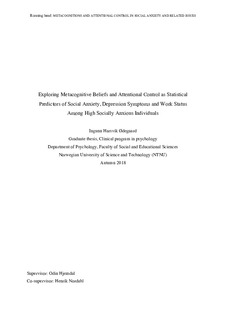| dc.description.abstract | Background: Social anxiety disorder (SAD) is associated with substantial individual suffering, lower quality of life and considerable economic cost for society. It is also considered a major risk factor for developing depression and is associated with poor occupational functioning. Prominent cognitive models focus on the content of thoughts and social fears as mechanisms underlying social anxiety and its related problems. However, the metacognitive model emphasizes metacognitive beliefs and individual differences in attentional control as important transdiagnostic factors underlying emotional disorders and related problems in general, and could therefore potentially provide new knowledge about which factors underlie social anxiety and its related problems. However, research on the metacognitive model for social anxiety is scarce, and no studies have, to the author´s knowledge, investigated the relative contribution of attentional control and metacognitive beliefs in this context. Aims: The current study therefore aimed to investigate the relative contribution of attentional control and metacognitive beliefs in explaining severity of social anxiety and depression symptoms, and as potential determinants of work status in an analogue SAD-sample. Method: In a cross-sectional design, 346 high socially anxious individuals participated in an online survey about psychological factors in social anxiety and related problems. Results: Attentional control- and metacognitive belief domains were unique predictors of social anxiety, symptoms of depression and work status even when controlling for social fears. Conclusions: These findings suggest that metacognitive beliefs and attentional control are important underlying factors of social anxiety, depression symptoms, and work status in individuals with social anxiety. These findings are in line with the metacognitive model and suggest that targeting poor attentional control and maladaptive metacognitive beliefs has the potential to reduce social anxiety and depression symptoms, and to facilitate return to work among those with social anxiety. | nb_NO |
